At the Crossroads
“It does not take much strength to do things, but it requires a great deal of strength to decide what to do.” Elbert Hubbard
Peter Quits his Job

Calgary in the Mid 1960’s
In the middle of July I got an unexpected three-day break without pay. It rained so hard for the entire time that all outside construction was grinding to a halt. Restless and deeply worried I studied again the classifieds in search for a more meaningful job. There I stumbled upon an ad of a geophysical company, which was looking for young candidates whom they were willing to train with pay as seismic observers. I had not yet learned that just because there were positions to be filled and companies advertised them in the newspaper did not mean that one had already landed the job. My youthful enthusiasm for a great opportunity for carving out a happy and prosperous future for Biene and me made me ignore all the hurdles I needed to jump in order to get the job. Nor did I heed the warnings of the somber prospects of separation, which inevitably would have come with the fieldwork in remote areas of the province. Having been apart for such a long time, this was the very thing Biene and I were trying to avoid. As always when I was all fired up and nothing in the world could dampen my zest for immediate action. I spoke with confidence and a fair level of fluency in English the day I contacted by phone the personnel manager of the company. He appeared favourably inclined – so I thought in spite of my strong German accent – and promised me to mail right away the necessary forms and a pamphlet what seismic work was all about.
On the very same day I also visited the campus of the University of Calgary to enquire about their teachers’ training program. Here too I was impressed with the friendly and professional manner the lady at the registration booth received me. Little did I know then with my naïve trust in outward appearance that in contrast to the rough and tumble world of the construction industry these people at the institutes of higher learning were trained to be kind, helpful and polite! It was part of their job. Smug about my progress I had made in a single day I rode the bus home to my brother’s place. High in spirit, already projecting myself far into the future and seeing us in our cute little bungalow à la Biene’s vision I sat down to write her a very long passionate letter that evening, essentially pulling us out of the deep trough we had just gone through with the loss of the engagement ring.
At the beginning of the following week the blazing midsummer sun returned full blast and was burning mercilessly from a cloudless sky. Mr. Milne phoned to tell me that he would start on a new building project in the town of Vulcan, where he had taken on a lucrative contract to build a movie theatre. Knowing me as a good and reliable worker, he had assigned me to a special work crew. I found the prospect of working long hours and of making more money quite alluring at first. At five in the morning I climbed on the back of the same old truck, which had taken me to my first job site in early June. There my Yugoslav coworkers and I huddled together for the ninety-minute ride to Vulcan, halfway between Calgary and Lethbridge. The first few days turned out to be quite tolerable in spite of the heat and the long hours. The walls were still low and the heavy concrete blocks were within easy reach of the masons. Best of all the cool of the early morning air lingered on for a good part of the day. It actually felt fairly pleasant to work under such conditions, especially when a breeze brought relief from the heat in the afternoon. Yet, I was totally exhausted after fourteen hours, out of which I was only paid for eleven, because they deducted the traveling time from my pay. I did not complain, the pay was good. I even had recently received a raise, which brought my weekly take-home pay to a hundred dollars. But in the second week the steadily rising walls were beginning to cut off any air circulation and the sun was relentlessly beaming down onto the building site. The masons working high up in the cool breeze were clamouring for the concrete blocks and were shouting at me to hurry up. Down in the searing furnace I struggled to keep up with the demand. With heat being reflected off the walls, the temperature was inexorably rising. I began to drink huge quantities of water and drenched my shirt in a desperate attempt to cool off the overheated body through sweating and evaporation. During such brief breaks, which I had granted myself to recuperate a little, I suddenly realized that the combined worst hardships I endured at the German army during basic training were by comparison to this hell like a pleasant Sunday school picnic. I felt like a slave in the service of Vulcan, the god of fire, after whom the town had been named.
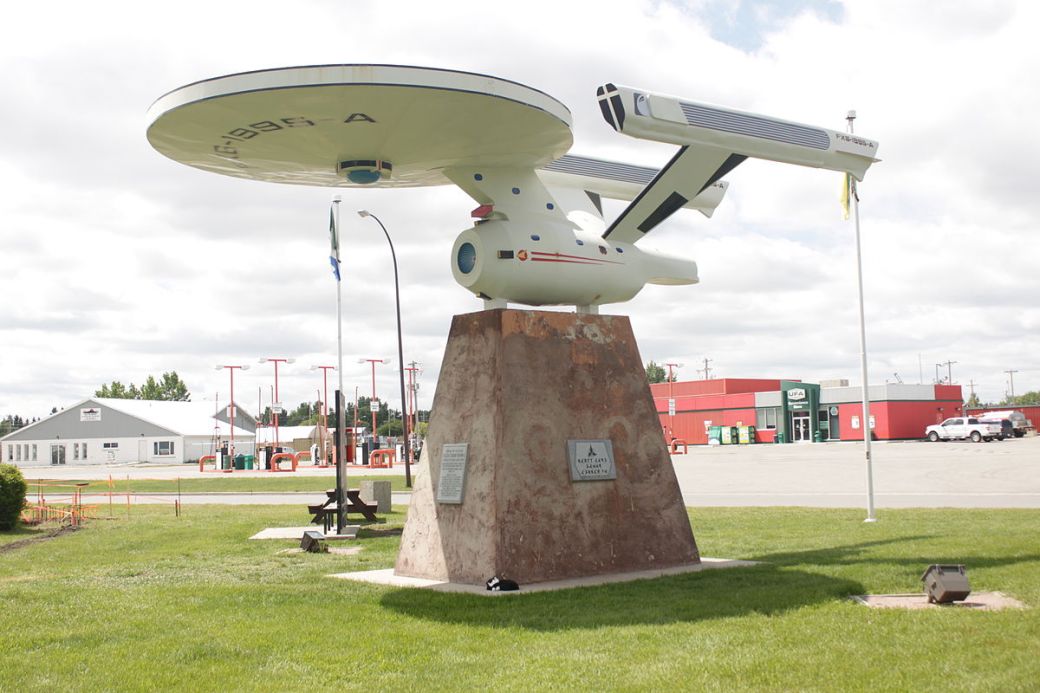
Star Trek Enterprise Replica in the Town of Vulcan – Photo Credit: Wikipedia.org
While I was standing there for a short moment leaning against a huge pile of blocks, my boss caught me, as he called it, in the act of loafing and severely reamed me out. It was there and then that I decided to work only till the next payday and to start looking for another job. Unlike my fellow workers from Yugoslavia I was not a slave of this construction outfit and had the freedom to quit.
Working on a Wheat Farm
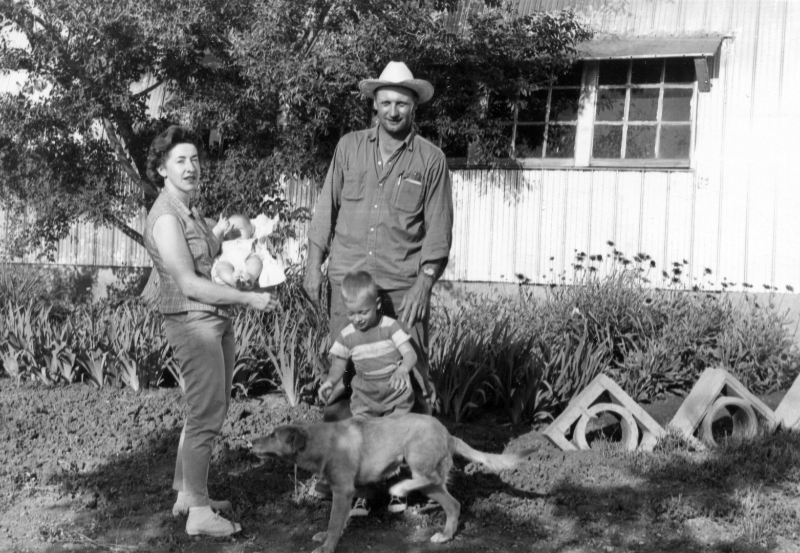
Harry Mueller and his Family in front of the Farm House
On the weekend Harry Mueller, a wheat farmer from the Hussar region and a good friend of my brothers Adolf and Gerry, dropped in for a short visit. When he learned that I just quit my job, he invited me to help out on his farm, where he would have plenty of work for me. He promised that in return for doing some basic chores he would pay me well in addition to free room and board. I would become part of his extended family that included his permanent farm helper and a young boy on a visit from California, whose company he assured me I would enjoy. I gladly accepted the offer, which after my ordeal as a labourer appeared to me like a godsend. Apart from the welcome change in scenery I felt it would be good to be away from Calgary for a while, where day in and day out I was sitting on pins and needles in tense expectation for some positive sign either from the university or the geophysical company.
I was the third of the Klopp brothers, who worked on the Harry Mueller farm. Adolf, who immigrated to Canada in 1953, had stayed the longest and had become quite attached to Harry and his family. He liked working on the farm. Life in a close-knit family after the turmoil during the postwar years in Germany must have been very appealing to him. Here he found everything he had been missing at home: stability, security, meaningful work, companionship with Harry, Eileen, Harry’s wife, and his mother Mrs. Mueller, whom I remembered well from her visit to us in Wesel in the late 1950’s. Adolf thrived in an environment, where he could see the fruit of his labours, see the results of a day’s work, and relax in the evening having a beer or two and shoot the breeze. He was not the type who would worry about events that may or may not disturb his life in the distant future. He lived very much in the present. His brother Gerry and later also Karl would do the worrying for him and urged him not to remain an unskilled labourer forever. Gerry after his arrival in Canada also spent some time at the farm, but just long enough, until he landed a job as a toolmaker at a bottle manufacturing plant in Medicine Hat. His ambitious nature would never allow him to stay at a dead-end job.
From the very outset it was clear that my time on the farm would be limited to two weeks. It became a respite from the harsh realities of hauling bricks and mortar. Indeed working for Harry felt like taking a holiday. Looking back I can safely say that quite apart from earning money I received much more than I was able to give. I learned to drive a tractor, operated a hydraulic lift arm, and was able to do in one day what the construction crew would not have accomplished in a week. There was a fence that had outlived its usefulness, which Harry wanted me to remove one fence post at a time. He showed me how to use the manual gearshift of the tractor, how to lower and raise the hydraulic lift, how to wrap a chain around the post, and how to attach the chain to the lift arm. Then he hopped on the tractor and gave a brief demonstration of the entire process. Being the owner of a full section of fertile land all planted in wheat, he had more important things to do than pulling out old fence posts. He left me with the encouraging remark, “I see you at lunch, Peter. Good Luck!”

Peter Pulling Fence Posts on the Harry Mueller Farm
I stood there for a while contemplating the incredible amount of trust he had placed upon my ability to live up to his expectations. I was determined not to disappoint him. At first I took ten long minutes to pull out just one post. But soon I got the hang of it and yanked three out of the ground within the same time period. When Eileen rang the lunch bell, more than twenty posts were lying along the narrow dirt road leading up to the farmhouse.
Great Blunder and a Gentle Rebuke

Half way through the afternoon I noticed that the tractor was running low on fuel. Harry had gone to town to get some supplies. So I took matters into my own hands and drove the tractor to one of the nearest fuel tanks. They stood high above the ground on sturdy metal legs, letting gravity do the work. After I was done filling up, I restarted the tractor and headed back to the nearest fence post. While I was driving, I detected an acrid smell in the air that I had not noticed before. Heavy black smoke belched out of the vertical exhaust pipe. The engine began to stutter and threatened to stall. Panic stricken I immediately turned off the ignition. At that very moment Harry had returned from town and parked his truck right beside me. From a mile away he had seen the ominous smoky telltale that there was something seriously wrong with his tractor.
“What did you do?” he asked.
“The tractor was low on fuel, so I decided to gas up,” I replied.
“Which storage tank did you use?”
I was getting a bit alarmed by Harry’s questions. Sensing that I might have done something wrong, I answered rather timidly, ”From the one nearest to us.”
“Well, Peter,” he began calmly explaining without the slightest trace of anger in his voice, “this is a gas driven tractor. You just refilled it with diesel. You did well in turning off the engine. You could have damaged it, you know.”
We spent the rest of the afternoon draining the tractor tank and refuelling it with gasoline. On startup dark sooty smoke was still spreading its foul stench into the air, but after a few more minutes the oil had been cleared from the internal parts. The engine was chugging along again at its regular smooth rhythm. How grateful I was to Harry for letting me carry on the next morning in spite of my blunder at the fuelling station!
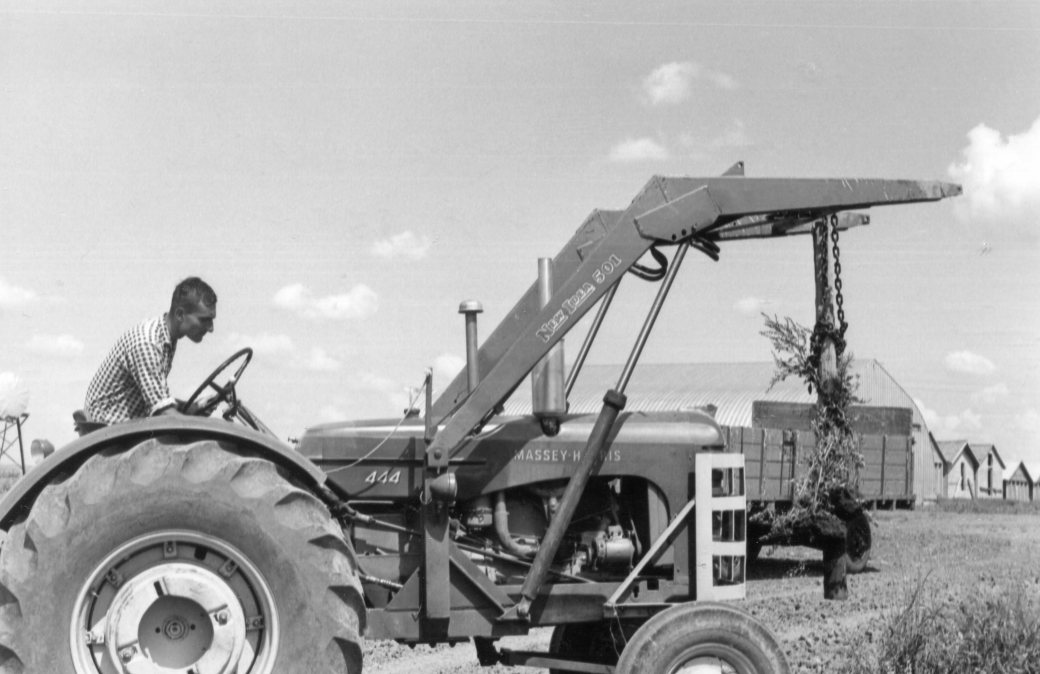
Peter Pulling out Fence Posts the Easy Way
At the end of the week I had pulled out all the posts, had loaded them on a utility trailer and had hauled them away. I was beaming with pride, when Harry entrusted me with a much more challenging task I was supposed to start on the following Monday. With the removal of the old posts I thought I had merely cleared away an eyesore, which would in fact be very low on a wheat farmer’s priority list. Rather I had created some more space for the expansion of the existing wheat field. Harry had already ploughed that part and said that my job would be to drag the harrow over it to break up the clods and remove the weeds. For that he added he would let me use the brand new John Deer tractor. It goes without saying I was absolutely delighted about my latest assignment.
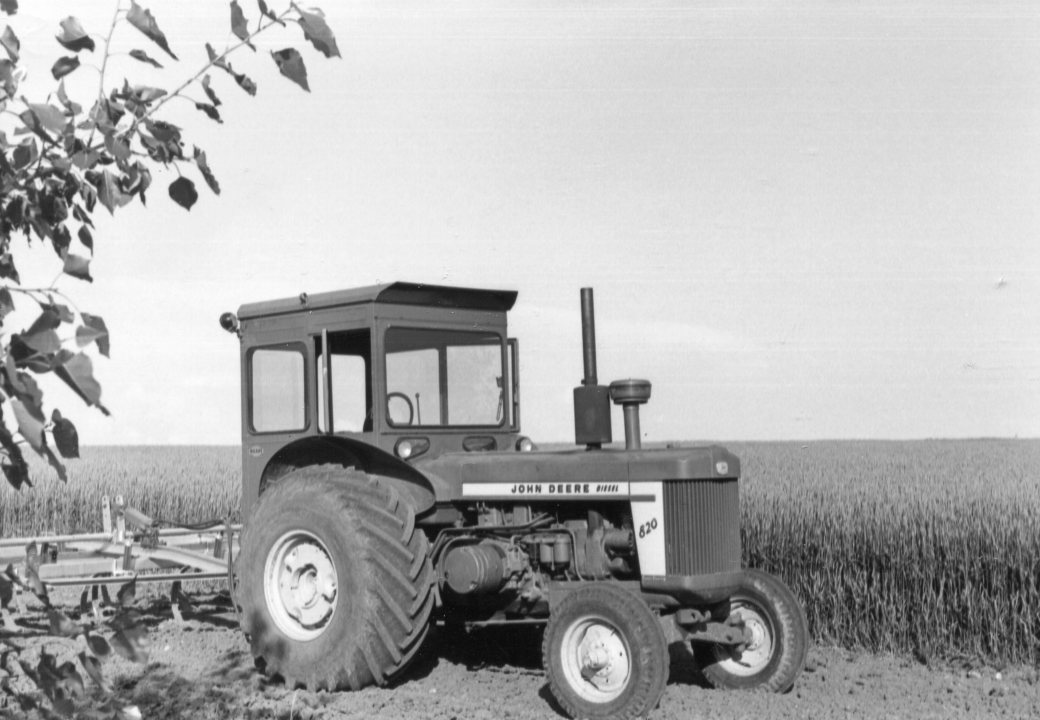
The Immense Wheat Field behind the John Deer Tractor
Anyone who ever stood in front of a wheat field so large that one could not see where it ended would understand my fascination about the mysterious way the wind was playing with each individual stalk to create the illusion of waves swirling over the giant expanse in front of me. Unlike an ocean wave, where the water molecules bob up and down and actually never move forward except at the surf near the beach, a wheat wave consists of myriads of stalks swaying in the wind following in faithful synchrony its force and direction. This is especially spectacular to watch when the direction of the wind suddenly shifts, at times creating the strangest patterns of circular motion. They appear to dance around as one unit until they suddenly dissolve and unite again in perfect harmony with the action on the entire field.
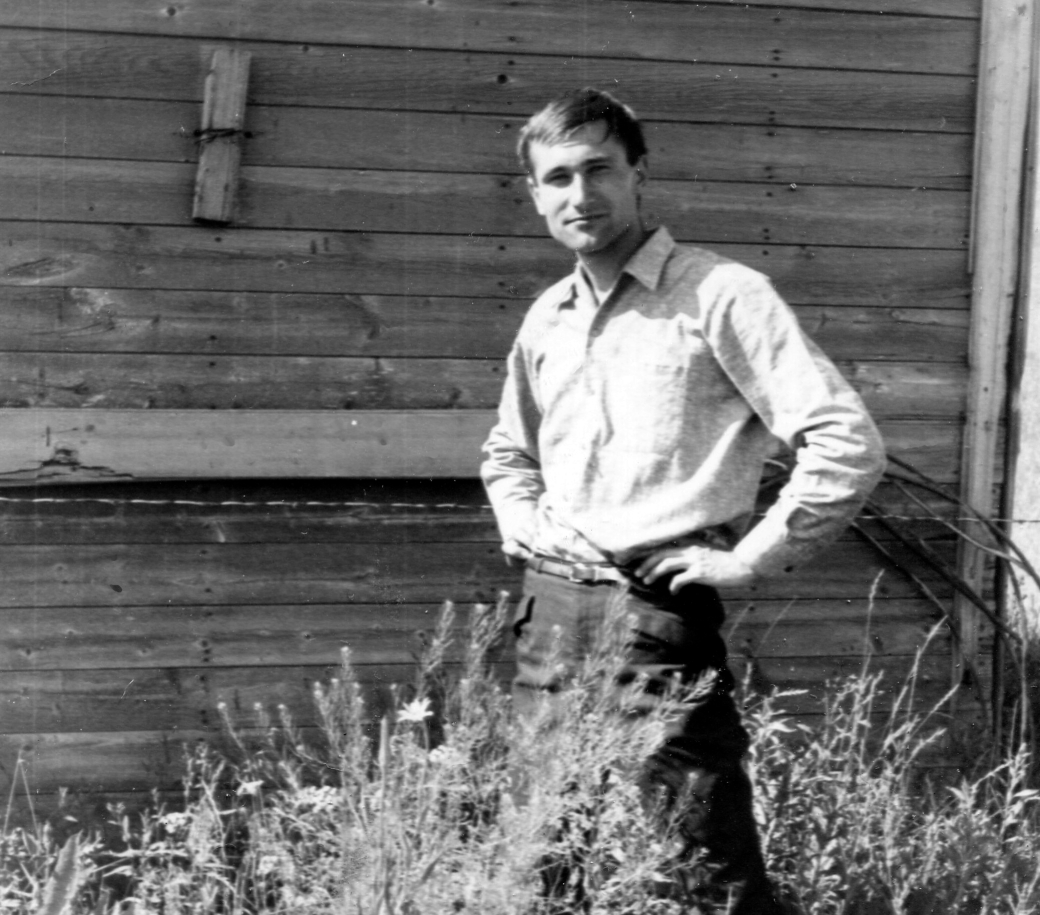
A Memorable Fishing Trip

Near the end of the week Harry, Gary, his permanent farm hand, Chris, the young boy from California and I were relaxing in the living room sipping cool beer straight from the bottle. Harry suggested that it was time for a break and that we should all go together to a remote lake in the Rocky Mountains, where he knew a good fishing spot. That was indeed good news, for I longed to be back in the mountains and fishing would be another skill I could acquire while enjoying nature at its best. The time before the harvest was relatively easy for the wheat farmers on the Prairie Provinces. They often took their vacation in July or August to rest up for the hard work that lay ahead, when they had to bring in the crops. For harvesting, timing was everything. If you harvested too soon and the grain had not matured properly, the wheat board would downgrade the quality. If on the other hand you waited too long and let the rain and sometimes even early snow dampen the grain, you would again not get top dollars for your harvest. Harry had $20,000 worth of high quality wheat growing all around his farmhouse, the equivalent of ten times the amount in today’s buying power.
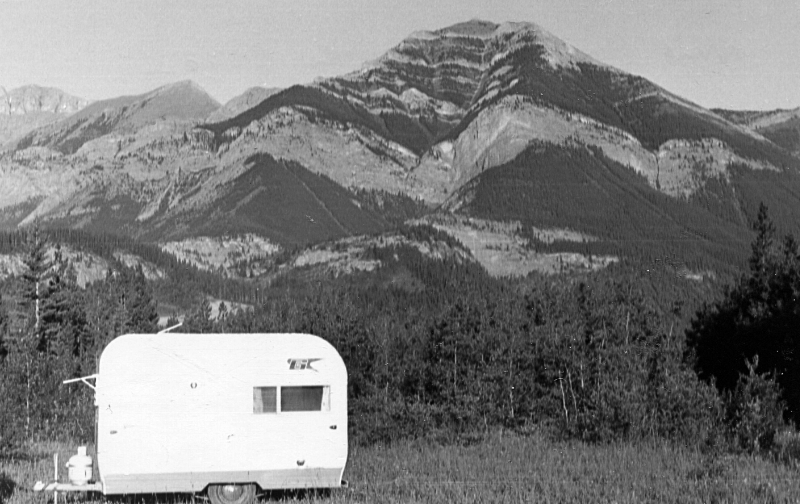
Bright and early on Saturday morning we were heading out to the Rocky Mountains. Harry had hitched to the truck his travel trailer, which comfortably slept the four of us. After a three-hour drive, he turned off from the main highway. Somewhere up a steep forestry road Harry knew a good fishing lake surrounded by snow capped mountains. Very few people dared to venture out so far into the wilderness. As it turned out, we would have the rustic campsite right at the edge of the lake all to ourselves. There was nothing to set up. Harry unhitched the trailer and blocked the wheels, while we helped by unloading the two boats off the truck and dragged them into the water. After a quick lunch consisting of bologna and cheese sandwiches, we were eager to try our luck in fishing.

Harry took Chris, his young guest from California along and directed his boat across the lake to a promising spot, where he had been fishing in previous years. Gary and I decided to make a circle tour hugging the rugged shoreline in the hope to reel in a good-sized trout or two. My interest in fishing was at best lukewarm. In my mind I saw me actually catch a fish, kill it somehow, and wondered how I would clean and make it ready for supper. Suppressing these disturbing images I focused on the beauty of the mountains all around us, the crystal clear water reflecting the majestic scenery in the still mountain air, and the bright blue of a cloudless sky competing with the dark green curtain of the impenetrable forest. The eyes of the scout in me were searching for suitable sites, where one day Biene and I could set up our little tent, here perhaps a bay with a sandy beach, there a small rocky island with a single spruce tree for protection and shade. A tug on my fishing rod pulled me out of my daydream.
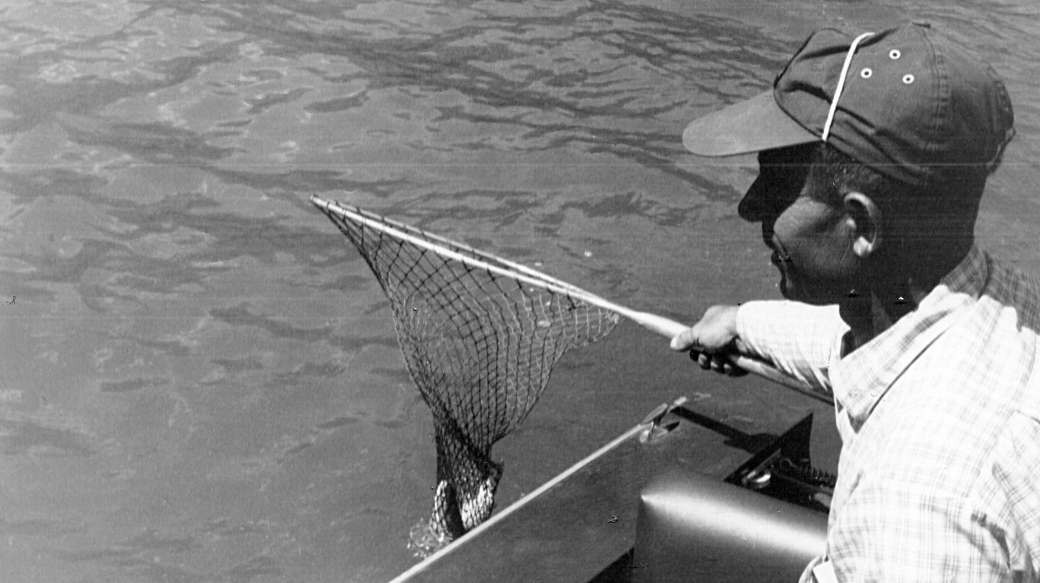
“Peter, I think you’ve got a fish on your line,” Gary said and stopped the outboard engine. Then giving me clear and simple instructions he guided me step by step in the fine art of landing a fish into the net. It was a medium sized trout. Gary grabbed it and through its gills he threaded a piece of nylon line, which was tied to the boat. Then he threw it back alive into the water where it would stay fresh and would not spoil on deck in the hot afternoon sun. This practical approach to fishing seemed cruel to me. Why not kill it immediately, I wondered. But my interest in fishing got a little boost with my first catch ever. After Gary had restarted the engine, I cast my line with greater enthusiasm. Soon after I felt again a tug and pulled in another trout. Before we had finished our circle tour, I had altogether caught three trout and Gary always too busy with the outboard motor nabbed only one. When Harry and Chris returned from across the lake, we counted six beautiful trout weighing a little under a pound each. Chris. barely able to hide his envy, commented, “Beginner’s luck!” So it was. The greenhorn from Germany had provided half the amount of meat for supper tonight.
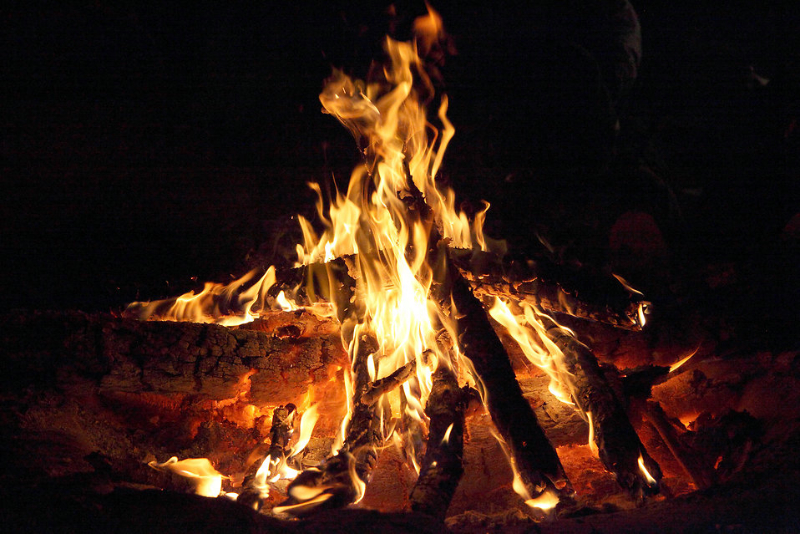
Fortunately, I did not have to kill and clean the fish. Harry and Gary took care of the messy job. They also looked after the cooking. I volunteered to make a fire. While I gathered rocks to build a safe enclosure, Chris helped me pick up dry twigs and branches from the forest floor, which he chopped up into small pieces with a hatchet. Soon we were ready to start the fire. I placed some birch bark in the middle of the fire pit. Then I built around it a cone of thin twigs with thicker, longer ones on top. I held a burning match close to the birch bark and said, “A good scout knows how to start a fire with only one match, even when it rains.” Almost instantly the flame fed by the oily substance in the bark spread quickly through the twigs. The crackling sound and the flames shooting higher and higher indicated to all that the one-match experiment had been successful. Chris and I brought out four lawn chairs and kept feeding the fire with bigger branches to make it ready for cooking. By now Gary had wrapped the trout in aluminum foil and suggested to let the fire burn down a bit so that the meat could be baked on the ember. Harry came out of the trailer with a large frying pan filled with cut-up baby potatoes. In no time at all a tantalizing aroma spread around the campfire and made our mouths water. A cynic would have quoted the old adage, ‘Hunger is the best sauce.’ Indeed, we were ravenously hungry. But in the great outdoors, where likeminded people gather around the campfire, a simple meal with just a few ingredients, such as freshly caught trout baked in butter, baby potatoes fried in vegetable oil, ketchup for extra flavour, and a cool beer that was in fact all we needed for total and complete satisfaction.
Pyramids from a Socialist Point of View

Egyptian Pyramids – Photo Credit: wikipedia.org
After sunset the air quickly cooled off. We threw more wood on the dying ember and moved our chairs closer to the fire pit. It provided the only light, as twilight gradually changed to complete darkness on this moonless night. Our teenage companion, who was first to break the contemplative silence in our group, astounded us with his patriotic, boastful chatter about California being in his opinion the greatest, the most beautiful, the most attractive, the most this and the most that place in the world. Harry impressed me with the calm manner, with which he countered the preposterous display of chauvinism, when he simply stated, “It takes a lifetime of traveling to many countries before one can decide which is the most beautiful place on earth.” Then in a conciliatory tone he added, “But there is one thing we can all agree on. This place here without comparing it to any other place is truly beautiful. I for my part wouldn’t want to be anywhere else.”
After a few more beers our conversation shifted towards more philosophical topics, such as the eternal grandeur of creation in contrast to the ephemeral nature of the man-built structures, even of the most enduring 5000-year old pyramids of ancient Egypt. When I ventured to express my admiration for the wonderful buildings that the ancient civilizations had created as lasting monuments to their cultural achievements, Gary responded rather disdainfully, “I don’t care two hoots about all these amazing structures in the world, because they have been built on the backs of millions of slaves, who had to sacrifice their lives in pain and agony so that one person, a pharaoh, a king or an emperor would be remembered as great and glorious in the annals of history.”
Gary’s unexpected outburst, tinged with socialist undercurrents, reminded me a little of my brother Adolf and his strongly worded attacks against the exploitation of the working class. But I had to admit that Gary had a point, which didn’t fail to leave a lasting impression on my way of thinking. Not quite firm in the pronunciation of English words I meekly said, “Nature is the best ‘arshitect’. So let us all admire its creation.”
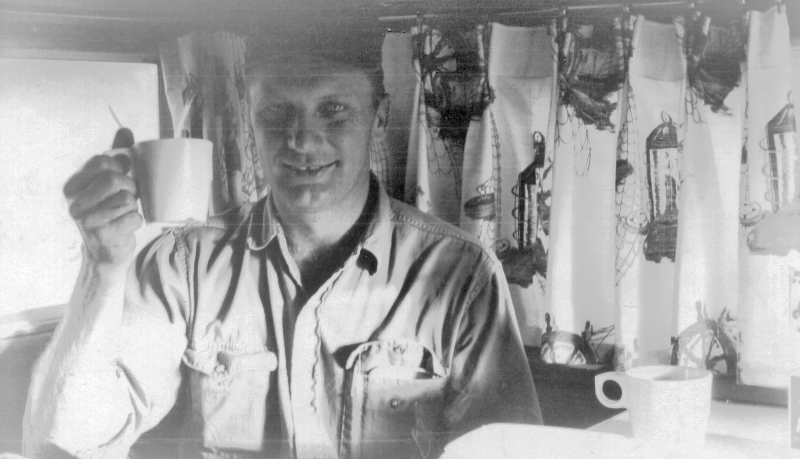
Harry Mueller in his Cozy Trailer
The fire had completely died down. The Big Dipper had moved a considerable distance during the last couple of hours on the starry northern hemisphere. It was time to go to sleep in Harry’s cozy trailer. I was in a very happy mood having plucked a delicate mountain flower, which I intended to send to Biene as a little memento of our weekend fishing adventure. Dreaming about owning a small trailer and traveling with it to a place like this with Biene, I drifted off to sleep being blissfully content with the world around me.
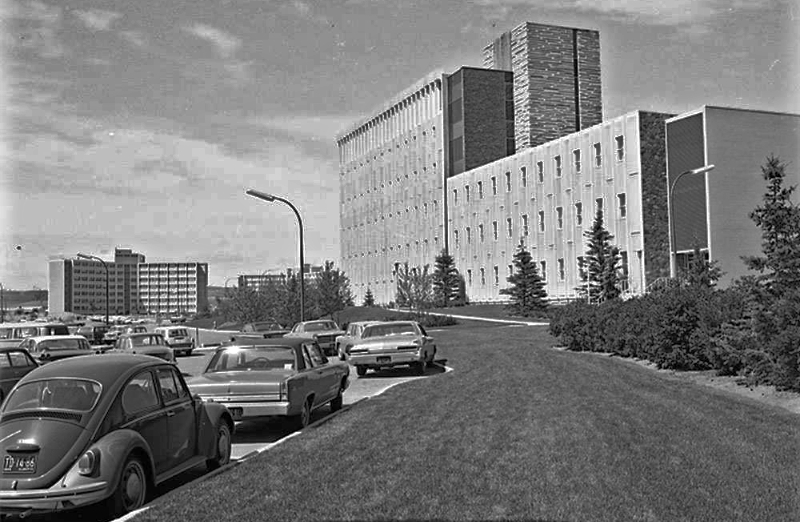
University of Calgary in the Mid 60’s
On the way home to the farm Harry dropped me off at Gerry’s place. It was very disappointing not to have any letters waiting for me, neither from the Employment Office nor from the University of Calgary. I was very anxious to find out whether or not my high school diploma had received full recognition for the entrance requirements. So I checked in at the registrar’s office. To my greatest relief, the secretarial staff had done their homework and reported that come September I would be eligible to begin my studies as a student in the Faculty of Education. Now the time had come to decide in earnest which program to choose. To make sure that I would succeed in my first two semesters not just with passing grades, but rather with superior marks in most subject areas, I embarked on a most unusual program. I selected German as my major and Mathematics as my minor. After a brief interview with the head of the Modern Language Department it was decided on the basis of my German background to advance me to the senior courses at the 300 level and above. In math I would take the mandatory calculus courses, which at least for the first semester would be simply a review of the material already covered at my final high school year. This arrangement with the core subjects, I thought, would enable me to concentrate my energy on the other subjects, such as English literature, philosophy, psychology and school administration, all of which required fluency in the English language. Having accomplished all this in the course of a single morning visit, I returned home full of confidence and wrote Biene a letter feeling on the top of the world again.
Peter’s Daring Request and a Chinese Love Poem
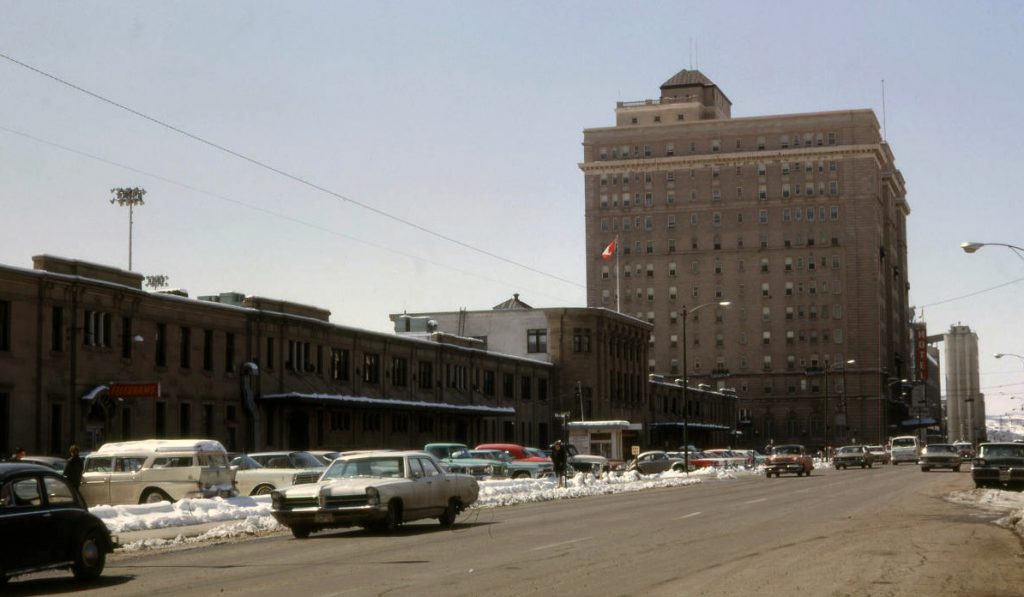
Calgary Pallister Hotel in the 1960’s
Still dwelling on my romantic sentiments fuelled by my recent fishing trip into the Canadian Rockies and riding now on a wave of euphoria brought on by my apparent success at the registrar’s office of the University, I sat down to finally write the letter to Biene, which she had been yearning to receive for such a long time.
August 2nd 1965 Calgary
My dear Biene, …And now I come to the most important part of my letter. Next April my first year will be over, and I will do everything in my power to pass all my exams. Then I will be at the halfway mark of my teachers’ training program, and the most difficult period of my studies will be behind me. However, a very busy summer will be waiting for me, because I will have to earn enough money to pay for tuition and living expenses for the second year. Since the direction, which I have chosen for my profession, will have been secured, I think that it will now make sense for you to come to me so that we two can take on the challenges of the last year together. That way we both will have worked our way up, and it will give us later the feeling of having reached our goal together. But above all remains the fact that I love you, and it seems to me now that two years of waiting will be unthinkable and unbearable. This summer has brought me so many wonderful experiences that I am hurting just to think that you could not share them with me. After your reply I will find out what to do next. I love you. Your Peter
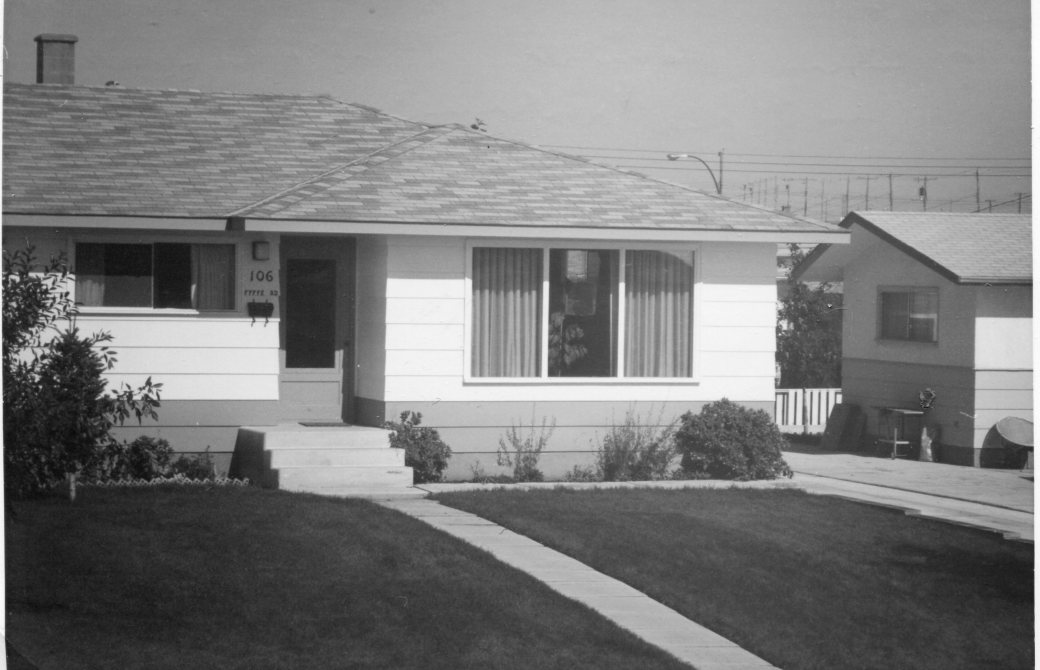
The House on the Fyffe Road
Four days later I received the devastating news from another department of the university administration that they had reviewed my high school certificate and determined that I would have to take a written English proficiency exam on September 10th. Only if I passed that test would I be admitted as student in the Faculty of Education. I was deeply worried, since I had only a month to prepare myself for this decisive moment in my life. Every day I wrote for practice a paragraph, sometimes even an entire essay on the topics I had gleaned from my brother’s old high school English text. I was afraid that if the standards were nearly as high as they were for essay writing in German at my high school, I would most certainly fail. I was clearly standing at the crossroads. The thought repeatedly crossed my mind to return to Germany and enrol at the University in Erlangen near Nuremberg, Bavaria, for the beginning of the fall and winter semester. Proud as I was, I rejected what was to me like an open admission of surrender of all the plans that Biene and I had made for our future in Canada. Going back to Germany would entail six long years of postsecondary education and an equally long waiting period, before I would reach financial independence. By comparison even one year’s delay here in Canada seemed preferable to me. So I boldly stuck my neck out and asked Biene to come as early as the following spring regardless of the outcome of the test on September 10th. In case I did not succeed in passing it, I would take night classes in English 30 and work during the day to earn more money for my studies in the following year. No matter what was going to happen, I thought, I would be teaching within three years. Biene and I would be navigating through the uncharted sea of an unknown future with the unshakeable trust of reaching eventually the island of a secure and happy life. The dreamer in me was temporarily getting the upper hand. Perhaps it is a good thing to lose oneself in one’s dreams every once in a while. As it turned out, there was no need to ask, to beg, or to entice Biene to come. Her reply was swift and passionately written.

Brothers Adolf (on the right) and Gerry, his Wife Martha and Son Wayne
August 7th Velbert
My dear Peter, How auspicious your letter already looked from the outside! When I opened it full of expectation and the color photos and the little mountain flower fell into my lap, I already felt that it would contain only good news. And really, from one line to the next I felt warm and happy all over. But when I came to the ‘most important part’, I lost all my composure. My heart leapt for joy and in my excitement I had to read twice before I could comprehend that you meant next spring.
O Peter, you don’t know, how much in the last little while my heart was sinking! I could not and did not want to tell you, because uncertainty lay heavily on your shoulders. You know, Peter, my thoughts about you and our future did not offer any calm. How often did I lie awake at night searching desperately for a solution! And always at the end I came to the same conclusion that if you stayed in Canada, I should come to you as quickly as possible. I wanted to write you this only when a decision had been made. Dear Peter, can you now feel what your question means to me? It feels like being liberated. To me it is as if you read my most secret thoughts, and I always have to think of the lines in the Chinese poem, which a poet had written to his wife over a thousand years ago.
‘I have read your silky characters
and distinctly saw the letters cry.
Hundreds of rivers and mountains block your path.
Yet in thought and desire we are one.’
…Over and over again, since you were gone, I had to think, how much better it would be to bear right from the start all our initial hardships together. When we are so far apart for such a long time, even the beautiful things we experience make us feel sad, because we cannot share them with each other. Isn’t that so?
See, dear Peter, I lived through some bad times after our flight as refugees from East Germany, and so I know that one doesn’t have to be unhappy in times of need. One just has to have confidence. Imagine, like you I thought of renting a room at the beginning. How more easily will we be able to work and learn, when the constant yearning is no longer eating away at our hearts!
Dear Peter, the main thing now for you to do is to write my parents and tell them what your thoughts are on all this so they can put their trust into our plans. When they notice that we thought this through maturely and prudently, they will find it easier to let me go …”

My Brother Adolf 1965
I was delighted, no, more accurately put, I was absolutely ecstatic about Biene’s affirmative response. We two were one heart and one soul with the same sweet wish to join forces to embark on life’s journey as one. However, I was realistic enough to realize that writing her parents at this time would do nothing to convince them of a stable, happy and secure life for their daughter in the light of the current uncertainty over my academic endeavours.
You certainly had some wonderful learning experiences as a young man—both in Germany and in Canada. Not many young people today work at hard labor in construction, work on a farm, and serve in the army. Perhaps young people would be more mature if they did have those experiences.
It seems as if we are soon approaching the part of the love story where I first tuned in—when you and Biene began the long struggle with her parents about her coming to Canada. Am I right?
LikeLiked by 2 people
That is right. Many of my blogging friends tuned in even later than you did. So I will carry on to the sweet end of the story. After that I will publish Biene and her parents’ story following their exciting journey up to the time we met.
LikeLiked by 1 person
Good! I’d also be interested in what you wrote about your family’s experiences during and after the war. I think you mentioned that you have written about that somewhere on your blog.
LikeLiked by 1 person
You can find prewar and war stories in the first six chapters of the Klopp Story on my blog. When the war ended I was just three years old. So I have no memory about the horrible events of the flight from the Red army. The Syrian refugee crisis is minuscule by comparison. Fourteen million fled or were forced to leave their homeland with more than 3 million unaccounted for. Such are the horrors of war, and it always the common people who suffer the most. My brothers Karl and Gerhard and my sister Erika wrote eye-witness accounts of these terrible times. Perhaps I will repost them one of these days. Thank you, Amy, for your interest! Have a good Day!
LikeLiked by 1 person
Once I catch up with the current story, I will look for those early chapters.
LikeLiked by 1 person
Peter, you are certainly no stranger to hard work! It takes character to always strive to do better and not mind working hard to get it!!
LikeLiked by 1 person
Thanks for the compliment, GP! It is always appreciated.
LikeLiked by 1 person
I love your writing and your story Peter. It amazes me the details you recall. I love the photos, but most of all I love how much you and Biene loved and love each other 🙂 ❤
LikeLiked by 1 person
I have lots of photos and they help to awaken my memory of past events. Thank you for your kind comment, Jodi!
LikeLiked by 1 person
Your spirit to grow shows in all the things that you did. Not everyone is open enough to accept new ideas and offers. You seem to be a positive person.
LikeLiked by 1 person
My optimism has carried me through many difficult situations, where others may have given up. Thanks for the comment, Arv!
LikeLiked by 1 person
Peter- I love this part of your story. It could be a good lesson for those who are so against immigrants and immigration. I remember having to do some jobs I didn’t like when I moved here to Holland or even when I got out of the active military in order to pay the bills. Hard work never killed anyone but few know the meaning of that anymore. I also look forward to the story of after the war , but until then I enjoy this story very much.
LikeLiked by 1 person
What you said about the changing work ethics of our modern times is so true. Hard, dedicated work pays off in the long run. Thank you for your insightful comment!
LikeLiked by 1 person
Fascinating to learn what life has in store for people and how you finished one degree and worked hard in construction and the fields after. What is funny, every time I feel up the car, I frantically check that it’s not diesel and here you are writing that you actually did that. Wow. So draining it would solve the issue…. Love the photos -great visual for the story. Very detailed memory and writing, Peter. Your kids have the best dowry of family history from you.
LikeLiked by 1 person
Right now my blogging friends show the greatest interest in our story. Our children and grandchildren will appreciate it eventually. Thank you so much, Luda!
LikeLiked by 1 person
I’m really impressed by your willingness to try your hand and new things, Peter! And also how hard you were willing to work to create a good new life for you and Biene. I know you hit some snags before she was finally able to join you in Canada, but your love and devotion was strong enough to prevail. Thanks for sharing your story with us…it is so interesting!
LikeLiked by 1 person
Thank you for your continued interest in our rather lengthy story!
LikeLiked by 1 person
Your interlude in Canada obviously gave you time to think about life and your future plans with Biene. It sounds like you didn’t linger too long at the crossroads, sticking to your Canadian plan, even if it seemed more daunting or complicated than continuing your education in Germany.
I really enjoyed your recollection of the pyramids conversation around the campfire and how it left a lasting impression on you. I couldn’t help but wonder if the slave-like bricklaying stint helped make that conversation seem a little more real? Simple discussions like this sometimes become much more a part of who we are than we realize at the time. I’d wager that you didn’t anticipate writing about this conversation in a family history decades later! Have a great weekend, Peter! Des
LikeLiked by 1 person
Oh, Des, I am deeply touched by your kind and insightful comment. I was lucky that none of us four sitting around the campfire were sports fans. I am not against hockey, baseball or football games. I even enjoy watching the occasional hockey game on TV, but I dislike talking about the endless variations of the same topic. Yes, I also believe that the discussions like the one we had on the pyramids have a lasting influence on our views of the world past, present and future.
On a different topic, I wonder if you have ever thought about how one can get more easily to the posts of long ago that lie buried in the chaotic assembly of files and rarely get back to the surface no matter how well they were written?
Thank again for your detailed comment, Des!
LikeLiked by 1 person
Another part of your love stories that I love the most. It shows how you don’t give up for any circumstance, Peter. You are such a. role model..
LikeLiked by 1 person
Thank you for the kind compliment, Nurul!
LikeLiked by 1 person
Peter, I appreciate your reply to my comment. I’m still a little puzzled regarding your question on posts of long ago…are you asking if I’ve wondered how one can retrieve older posts that are now difficult to find? Funny you should ask, because I’ve spent some time trying to find posts from a long time ago that I thought I had archived properly. I think I’ll wait to answer though, until I understand better what posts we’re talking about. If you’d prefer to take it offline, you can e-mail me at lawnfly@mailfence.com. Either way, let me know and I’ll try my best to give a somewhat sensible answer!
LikeLiked by 1 person
Sorry, Des, of having created some confusion about a more efficient way of archiving and organizing our posts into a cohesive whole accessible to family members and other bloggers. What I will do in terms of clarification is to write a post in the near future about my attempts to accomplish this. Have a great week and stay warm, Des!
LikeLiked by 1 person
No problem, Peter, having lost archived posts in the past (not just from WordPress), I’m looking forward to your post!
LikeLiked by 1 person